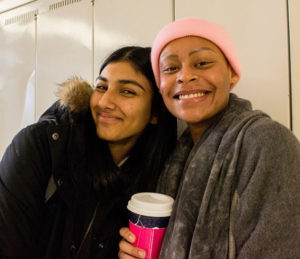By Loose Lips Mag
@looselipsmag
During our interview with Janessa St. Pierre, it becomes even more clear, and more important to acknowledge, that young people are the future. At 20 years old, the Vancouver native is already a budding filmmaker, writer, and former film school student. She’s an advocate for Alopecia awareness, and a megaphone, both online and in the real world, for active representation and equity in media, pop culture and institutions like Capilano University.
Her tenacity has allowed her to create art derived directly from experience, and while her lens is often rife with racism and oppression, she’s using her craft to create conversation, awareness, and social change.
During her time at CapU’s Motion Picture Arts Program, St. Pierre wrote the script for Think Again: a short drama directed by Prabhjot Nijjar that pulls from St. Pierre’s own experiences with racism in the classroom, exploring the themes self-worth, identity, and redemption. Think Again has recently been submitted to 13 film festivals, and is in consideration for the Vancouver International Film Festival and the Toronto International Film Festival.
Loose Lips sat down with St. Pierre to learn more about Think Again, on being a black student at Capilano University, and what the #representationmatters movement means to her.
Loose Lips: Let’s talk about the program you took at Capilano University!
Janessa St. Pierre: I was in the MOPA Program at Capilano University for two years; the first two years are really focused on technical work and you basically learn every role in the film industry and that way you can figure out what you like and don’t like in the industry. I figured out that I really love writing and directing–that’s what I want to do–but I also am really interested in set decorating and production design. I’ve made a couple of connections with production designers here in Vancouver, and I’ve already worked on a couple of projects and I’m very thankful that I’ve been able to do so!
You’re in very small groups at Cap U, and it’s very hands on. Right away we learnt how to use a camera, and every aspect and job when working in film. It’s so great to learn every role because when you go on set in the real industry, you actually have an idea of what’s going on.
LL: What did you love about your program?
St. Pierre: It’s great for women going in to film to have some kind of credential behind you. A lot of people told me you don’t need film school, and maybe in a lot of ways you don’t, but I think that it’s really good to have proof of education so that you can show that you can do this job, and you learned on the same playing field as everybody else.
LL: When did you know you wanted to get into filmmaking?
St. Pierre: I was actually training to be a professional dancer; I danced my whole life and my small circle of friends and I always made little videos. Growing up, my family and I watched a lot of movies together. I’ve always been entranced with being able to escape into a story. I knew that there was a lack of representation of black women in films, and I want to be a person to [step up] and write real stories.
LL: We’re dying to know more about short film Think Again
St. Pierre: Well, it’s really exciting. I submitted it to about 13 festivals, and it’s inconsideration for VIFF and TIFF and a few startup festivals in the U.S. I’m hoping that this short does get in there, and does get shown. It’s a story that is based on true events and I hold it close to my heart, and it’s very personal. It’s a situation that I’ve gone through, and I wish that I did what the character does in the film, in my real life experience.
I wrote the script for this film, and I was also the Production Designer. My friend, she’s South-Asian, she decided to direct the film. At Cap, the classes are very white, and some aren’t very interested in projects with characters that aren’t white, a lot of the guys in the class are touchy about these subjects and there is a lot of issues about feminism in class. I felt really unsafe in the classroom, and writing this throughout the year helped me, because at least I was doing something.

LL: Was Think Again a class project?
St. Pierre: Everybody in the class writes scripts and the whole class votes on what story they want to produce. A director chooses a script from our class pool and they pitch it to the class, and whatever projects are the top chosen three, are the ones produced the following semester.
I was pleasantly surprised that my project was chosen and that my [classmates] felt like this was a story that needed to be told. And it made me feel hopeful!
LL: In that same class, we read in a previous interview that you had issues with teachers using awful language including the N-word. Are you exhausted from having to educate people who are supposed to be authority figures?
St. Pierre: YES. That’s what Think Again is really all about–a girl expecting that her institution, her school, her teachers would protect her–and that’s not the case. You’d think it was a common knowledge to not use the N-word, but in my experience, I’ve heard it a lot. I’ve got a lot of comments when I was writing the script, or when we were doing table reads, the “did this really happen” question, and “this just doesn’t seem real. This doesn’t seem like something that would happen in Vancouver.”
A lot of the stuff in the [Think Again] script are real things that did happen to me going to school in here Vancouver. I really hope that my film shows that there are different levels of racism, and people might think that they aren’t racist, but it’s very easy to get caught up in pop culture and by content being out there discussing this, I hope people will think more about what they say and what they believe to be real. It’s adding to the conversation and giving people more to think about.
LL: The hashtag and movement, discussing representation and #representationmatters is really important and something a lot of people are discussing right now. Does that give you some kind of hope for change in media and in culture?
St. Pierre: Yeah it does. People getting on board with real representation, especially in Hollywood does give me hope. Being in film school and having to learn about the misrepresentation and the underrepresentation in films is really, really hard. Some films that we look up to can be so racist and so awful, but other people have the privilege to look past that. Sometimes though, I do feel like people want to just check the box and I don’t want this [important movement] to become something that tokenizes or commodifies different races and women. I want to make stories that involve everybody and that’s my goal: I want to make content that’s real, and content that discusses important issues but I don’t want it to be a sub-category that only explores race.
LL: Do you have any other creative projects on-the-go right now?
St. Pierre: I want to start writing something this year and basing it on beauty. I went through hair long this past three years, and it’s taught me a lot about beauty and the way society makes you feel. With my hair loss, I felt as a woman, very [shocked]. I never saw images of women with bald heads being adored, so I had to make a 180 degree switch in my mind and completely abandon beauty standards in order to get through this and I want to express that in ways that other people can identify with.
A lot women spend their whole lives getting to a place of self-acceptance and I had to do that really quick, and I had to, or else what would I do? Feel sorry for myself? I can’t do that.
LL: We want to learn more about your advocacy for Alopecia Awareness and your platform for that.
St. Pierre: I definitely want to talk about this more, now that I’m more comfortable with it, and I see other women out there doing it. It really inspires me. I definitely want to do maybe some more modelling, and the Alopecia community on Instagram is really supportive.
LL: What’s your thoughts on racism in Canada and the lack of discussion around that.
St. Pierre: I feel like it’s just as bad here [as it is in the United States]. I feel like Canadians are entitled; Vancouverites especially too. I grew up here, but I moved away to Montreal for a year, and I feel like after talking to people there, and having these discussions, it was finally understood. Of course, it’s not perfect, but it was so much better than the [West Coast mentality]. That’s why I really encourage white people to dig deeper and have these discussions and important conversations. Own up to your own biases and then change will happen.

Kristi and Brittany are the co-founders and co-editors of Loose Lips Mag. Together, they’re building their feminist media empire—leaving the patriarchy, charcuterie boards and empty bottles of wine in their wake. Loose Lips Media is grateful to operate on the unceded Coast Salish territory of the Musqueam, Squamish and Tsleil-Waututh First Nations.




